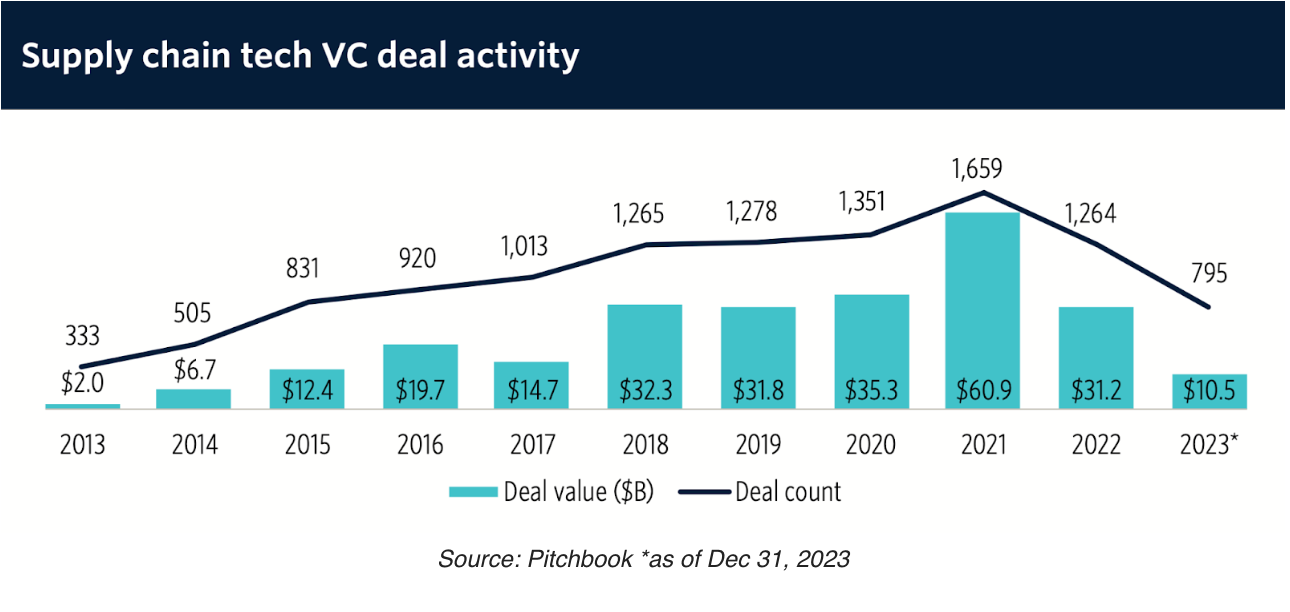
The next frontier in Supply Chain Innovation
Global supply chains are undergoing a monumental shift, prompted by several key trends and macroeconomic factors. The Covid-19 pandemic's disruption, geopolitical tensions, and labour shortages have exposed the lack of resilience and visibility across the supply chain. Simultaneously, environmental and ethical concerns amplified by regulatory tailwinds are pushing companies towards more transparent and green supply chains and an increased focus on sustainability and ethical sourcing. These shifts, combined with advancements in technology such as AI, blockchain, and sensors, have resulted in rapid innovation in supply chain technology.
Venture capital has not been blind to these shifts. Recent years, fueled by Covid-19, saw substantial investments flowing into supply chain tech, notably in transportation, across freight, shipping, and last-mile delivery, as well as warehousing and fulfilment. Funding in supply chain tech has seen 70% growth per year since 2014, reaching an all-time high in 2021. However, the subsequent shift in consumer spending from goods to services and associated decline in online retail led to a major investment decline specifically in distribution & fulfilment, last-mile delivery and warehouse picking. Lower investment, combined with broader economic slowdown over the last two years has resulted in some high-profile logistics companies failing (Convoy) and significant layoffs across the industry. Nonetheless, investment in critical areas such as sustainable logistics continues to rise, and the overall upward trend won’t be reversed despite the recent dip.

The critical need for continued supply chain innovation in resilience, visibility, and sustainability proves that supply chains span much broader than what is conventionally referred to as logistics, and we believe that there is ample opportunity for continued investment.
Our Deep Dive on Global Supply Chains
Our investment thesis is grounded in a holistic understanding of Global Supply Chains. Though we conventionally speak of "The Supply Chain", the reality is a complex, vast network of nested and interdependent supply chains. While some of these are geographically global, we think of it instead as a global system, one that encompasses all parts of the value chain both locally and internationally, across a variety of modes of communication, transportation, and data exchange. At Project A, we break down Global Supply Chains into the following core areas.
- Procurement
From tactical spend analysis to strategic supplier management, the procurement sector offers vast ground for disruption and is one of the most funded parts of supply chains. Technologies enhancing B2B marketplaces, enriching supplier discovery (Scoutbee) or management (Tacto), automating negotiations (Pactum), and streamlining procure-to-pay processes (Pivot) are just some of the ways procurement processes are being enhanced. - Supply Chain Planning
Crucial for orchestrating the balance of supply with demand, technology-driven solutions in demand forecasting (Quantics), production and resource planning (Flowlity, Metronome), and effective inventory management (Katana) embody the strategic pivot points for achieving efficiency and adaptability in supply chain planning. - Transportation
The transportation segment spans a wide spectrum, from digital freight forwarding across road (Sennder), air (cargo.one), and maritime freight (Forto), including innovations in autonomous and electric freight solutions (Fernride), workflow automations on top of transport management systems (Raft) and new delivery services, to asset-light last-mile parcel delivery (Relay) and drone delivery (Manna, Skyflow). The focus here is on optimising the movement of goods through smarter, cleaner technologies. - Intralogistics & Warehousing
After a wave of VC funding in fulfilment providers (Hive, Alaiko, Byrd) the warehousing domain is witnessing transformative changes with the introduction of robotics (Dexory, Filics), advanced Warehouse Management Systems (WMS) and innovations in on-demand logistics services (Spacefill, Unnbound), setting new paradigms for inventory and fulfilment operations. - Manufacturing
The adoption of robotics (Robco, Wandelbots, Micropsi), the rise of on-demand manufacturing (Saeki), and the customization of production processes (Assemblio) underscore the manufacturing sector's evolution, enabling more agile and bespoke production capabilities at scale. - Supply Chain Optimisation
From risk management (Prewave) to enabling supply chain visibility and sustainability (Makersite), investments in technologies like IoT for tracking and analytics for smarter decision-making (Tradelink) are redefining what it means to optimize supply chains. Further, data interoperability solutions (Procuros, Sento) are paving the way for more efficient communication across a variety of industries while sustainable supply chain solutions are enabling decarbonisation of supply chains (Neutreeno) and regulatory compliance (zero44) at scale. - Supply Chain Services
This broad category encapsulates essential operational elements such as finance (Finmid), payments (Tilta), workforce solutions (Traba) or seemingly niche areas like spare part logistics (Sparetech) or maintenance (Remberg), with a keen focus on integrating and enhancing service delivery within supply chains.
Beyond and within these seven core areas, we believe that certain industries face unique challenges and hence require specialised supply chain solutions – food (Root Global), medical, fashion (Retraced), and materials supply chains (Metycle, Waypoint) are examples of verticals where we will be looking for targeted solutions.
In the publications to follow, we will delve deeper into each of these critical segments of Global Supply Chains, uncovering the nuances, challenges, and opportunities we see within. Join us on this journey as we explore the potential for innovation and investment in the backbone of the global economy.